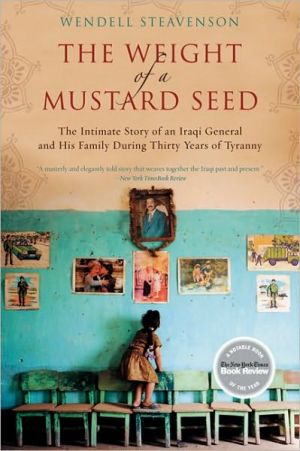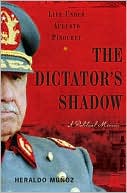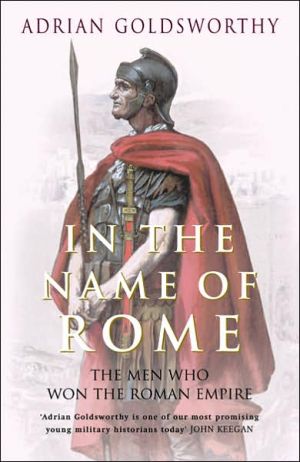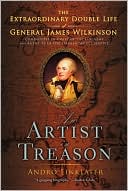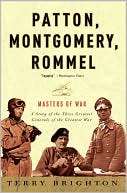The Weight of a Mustard Seed: The Intimate Story of an Iraqi General and His Family during Thirty Years of Tyranny
General Kamel Sachet was a favorite of Saddam Hussein's, a hero of the Iran-Iraq war, head of the army in Kuwait City during Desert Storm, governor of the Maysan province, and father of nine. How did Sachet and his fellow Baathist loyalists live in Saddam's Iraq...and how did they live with themselves? Why did they serve such a monstrous regime? And what finally opened Sachet's eyes to the fact that he was a participant in a system of terror and repression that was strangling his country and...
Search in google:
General Kamel Sachet was a favorite of Saddam Hussein's, a hero of the Iran-Iraq war, head of the army in Kuwait City during Desert Storm, governor of the Maysan province, and father of nine. How did Sachet and his fellow Baathist loyalists live in Saddam's Iraq...and how did they live with themselves? Why did they serve such a monstrous regime? And what finally opened Sachet's eyes to the fact that he was a participant in a system of terror and repression that was strangling his country and destroying its people? Through the remarkable story of General Sachet and the stories of those around him, author Wendell Steavenson goes behind the headlines to examine a national tragedy begotten of unintended consequences. The Weight of a Mustard Seed is a gripping account of one man's rise and fall, and a vivid, compassionate portrayal of the Iraqi people. The New York Times - Robert F. Worth …a masterly and elegantly told story that weaves together the Iraqi past and present. [Steavenson's] subject is Kamel Sachet, an Iraqi general and war hero who came to despise Hussein, and was finally executed in 1999. Steavenson…set herself a difficult task: Sachet died long before she ever set foot in Iraq. The country began to implode soon after she arrived in 2003, making it even harder to piece together his life. But she succeeds, and makes his story a powerful inquiry into the moral question at the heart of Hussein's Iraq and so many other dictatorships: Why did people go along with it? Did any resist? And if so, what made them different?
The Weight of a Mustard Seed\ Chapter One\ His Wife\ The sachet family lived in saidiya. saidiya was a district settled mostly by army officers on plots gifted from the government. It was a typical Baghdad neighborhood of cubist concrete houses stretched along highways built in the money-slick boom of the seventies, now sunk under the parched weeds and rubbish drifts and rubble of a flyblown sanctions decade liberated with an invasion.\ In August the 133 degree sun switched off at dusk and the baked concrete of the city radiated into the evening. Not a cooling darkness, no puff of wind, but respite enough to venture outside, stretch your legs, sit in a café, sticky-necked in the furnace heat wreathed in kebab smoke, with a fuzzy warm Pepsi and listen to the traffic cacophony of a million second-hand cars flooding over the suddenly open border—no customs duties! No exit visas! No immigration officials! Nothing! Honking jammed in front of the traffic policeman at the intersection, stuck in a forty car line at the petrol station, brandishing a pistol at a line jumper, buying "jellycans" of fuel from the lithe and scabby black-market street boys. The shops cascaded pent-up imports onto the sidewalks: satellite dishes, electric fans (although the electricity was variably on-off—three hours on, three hours off), mobile phones (it was rumored a network would be set up soon), tinsel, gold painted chandeliers, strings of multicolored fairy lights, cherry glitter lipstick, leopard print lingerie (for a woman must look enticing for her husband), pink dolls for daughters and plastic Kalashnikovs for sons. Men sat about, in sandals with crackedheels and loose tracksuit trousers, chain-smoked and complained about the electricity, the water, the Americans, no jobs, no rights; women walked past in long gowns and headscarves carrying kilos of tomatoes; small boys crammed the new internet shops, noses pressed against dusty second-hand monitors, gleefully, heedlessly playing Gulf War One, playing Americans hunting down Iraqis because the game was designed with only one protagonist.\ We drove through the shopping throng, ignored the gunshot that might have been a car backfiring except that it really was a gunshot, past the tract of waste ground, right at the half-built mosque, raw and gray under redundant construction cranes, past a small abandoned police post; wove between a palm trunk chicane, a ball of tumbleweed razor wire and a pool of emerald sewage into an unassuming street of small villas with walled front gardens.\ Kamel Sachet Aziz al Janabi had been a commander of the special forces, the general in charge of the army in Kuwait City during the Gulf War and a governor of the Province of Maysan, but the family's house was a modest, pleasant, middle class affair and there was nothing of the grandiloquent marble columns and bronze glass of the elite Baathie facades. The formal reception room for guests, where I was received, was large, bright and comfortable; I sat on a sofa in front of a glass coffee table laid with crocheted table mats and a vase of plastic roses, my translator sat next to me. The Sachets were very proud of their father and were happy to talk about him. We met in that first summer, each of us full of curiosity, optimism and excitement. They had a lot of questions for me: Why had the Americans invaded? Was it for the oil? What kind of government would they install? But by the following winter, the Abu Ghraib rumors and detentions and hard knock raids had depressed all of us and I was reduced to apologizing—shaking my head, as abject and angry as they were—for the occupation.\ Once or twice the daughters brought me into the private interior of the house, leaving my male translator behind, to show me something: how Ali, the second son, had decorated his room in pink satin and tulle for the arrival of his new wife, a new baby; or how to stuff eggplants. But usually when I visited, once or twice a week, I sat in the reception room and various members of the family would come in to say hello, bring me tea and then coffee, and sit for a talk.\ Kamel Sachet's wife was Um Omar, Mother of Omar (her eldest son), mother of his nine children. In rough order: Shadwan, Omar, Ali, Sheima, Amani, Ahmed, Zeinab, Mustafa, Zaid—and a burgeoning number of toddling grandchildren. She was a warm matriarch. Kissing her hello was like putting your arms around a feathered divan; when she moved it sounded like a swishing quilted curtain. She was firm and yielding; soft and bulky and upholstered in voluminous black velvet. She had aged into house-mother doyenne, indulgent of her family brood and prone to twinges of nerves. From time to time she suffered acute but nonspecific complaints: sleeplessness, problems with her stomach—not exactly a cramp but not exactly an ache. Once she went to three doctors in a week and came back with a bag of medicine, sleeping pills, anti-depressants, antibiotics and, bizarrely, typhoid tablets. I brought a doctor friend of mine to give her some proper advice. She felt dizzy, she felt sick, but she had not been sick, yes, it happened once before like this, and it was very bad, that time she had fainted, maybe it was stress—yes, she nodded as my doctor friend explained the intersection of psychosomatic and physical. He told her to relax and not to worry and then some bomb banged distantly as if in ironic response.\ The Weight of a Mustard Seed. Copyright (c) by Wendell Steavenson . Reprinted by permission of HarperCollins Publishers, Inc. All rights reserved. Available now wherever books are sold.
Author's Note 1Prologue 51 His Wife 112 His First Victory 293 His Eldest and Favorite Daughter 354 Inside 425 Yes, But 596 His Third and Most Religious Son 907 "Are You Sure It's Not Kut?" 1068 Euphemisms 1299 Uprising 14110 The Good Caliph 15111 Mosque 17112 His Sheikh 17813 Shame 19914 Pride 20415 Waiting 21016 The Carcass of an Abandoned Refrigerator 22017 Collection 23818 Generals in General 247Epilogue 263Cast of Characters 275Acknowledgments 287
\ The Times (London)Praise for STORIES I STOLE: “[This] unusual and beautifully worded tale is, mercifully, nothing like the usual foreign correspondent’s end-of-term book…[An] accomplished narrative-part travelogue, part love story…When [Steavenson] tells Georgian people’s stories, you hear real voices.”\ \ \ \ \ Time Out New YorkPraise for STORIES I STOLE: “Lovely…Stories I Stole, like the works of Bruce Chatwin or Ryszard Kapuçinski, is poised somewhere between memoir and ethnography…The great heart of the book, though, belongs to the people [Steavenson] met.”\ \ \ Jonathan SteeleIn the ever-rising pile of Iraq books, Wendell Steavenson's work stands out for its strikingly different approach. She goes back to the decades before the U.S. invasion to uncover the fears and emotions of the men who worked for Saddam Hussein…a first-class investigation, The Weight of a Mustard Seed…pieces together a quilt of hard reporting and intelligent speculation that tells the reader more about the tensions of living close to power in Saddam's dictatorship than almost any previous effort by a Western writer.\ —The Washington Post\ \ \ \ \ Robert F. Worth…a masterly and elegantly told story that weaves together the Iraqi past and present. [Steavenson's] subject is Kamel Sachet, an Iraqi general and war hero who came to despise Hussein, and was finally executed in 1999. Steavenson…set herself a difficult task: Sachet died long before she ever set foot in Iraq. The country began to implode soon after she arrived in 2003, making it even harder to piece together his life. But she succeeds, and makes his story a powerful inquiry into the moral question at the heart of Hussein's Iraq and so many other dictatorships: Why did people go along with it? Did any resist? And if so, what made them different?\ —The New York Times\ \ \ \ \ Publishers WeeklyEarly in this portrait of Iraqi general Kamel Sachet, Steavenson (Stories I Stole ) warns, "In Iraq, there was never one story, there were always many stories, layers of episodes, each one a wound." She examines the life of General Sachet from his humble beginnings to his rise in the Iraqi army and his growing closeness with Saddam Hussein. Sachet was commander of special forces and the general in charge of the army in Kuwait during the first Gulf War. His life was one of service to his country, and his moral compass set by a military code. Yet his obedience, Steavenson reveals, came at a price: as his repulsion for the demagoguery of the Baath party and Saddam's sadism grew, the terror tactics of the regime kept him and his peers paralyzed. Steavenson is a talented writer and her reconstruction of Sachet's story is staggering in its revelation of a collective psychological trauma that continues to grip a nation. (Mar.)\ Copyright © Reed Business Information, a division of Reed Elsevier Inc. All rights reserved.\ \ \ \ \ Library JournalMore than five years after the U.S. invasion of Iraq and the overthrow of the Baathist government of Saddam Hussein, the country still teeters on the brink of chaos and intercommunal warfare. Can Iraq's recent past explain its current predicament? In this engrossing book, Steavenson (former London correspondent, Time) explores the question by examining the life of Gen. Kamel Sachet, who, before his 1999 execution by the Baathist regime, was a highly decorated officer and a favorite of Saddam Hussein. Drawing on five years of travel and interviewing many Iraqis, including Sachet's family members, the author vividly portrays the moral dilemmas and contradictions that many Iraqis grappled with as they lived and worked under Saddam's dictatorship. For example, although General Sachet was a hero of the Iran-Iraq War and served the Baathist regime as the head of the Iraqi occupying army in Kuwait City during Desert Storm, he refused to allow his sons to join Saddam Hussein's army, which he had termed a criminal organization. The book allows readers to focus on the personal as a means to understanding the political and military calamity that has tragically defined Iraq in the past four decades. Recommended for all public libraries.\ —Nader Entessar\ \ \ \ \ \ Kirkus ReviewsThrough the grim travails of one of Saddam Hussein's top generals, journalist Steavenson (Stories I Stole, 2003) examines the dictator's edifice of totalitarianism and moral corruption. Taking her title from a verse of the Koran promising to mete out justice even to the "weight of a mustard seed," the author weaves a fascinating account of how good men went terribly wrong. Steavenson worked as a journalist in Baghdad in 2003-04 and continued her interviews of exiled Iraqis in London and elsewhere, probing deeply into the stories of former Baath Party officials. Through a high-level Iraqi doctor who had served in the medical corps during the course of four Iraqi wars, the author was put in touch with the surviving family of Kamel Sachet, a commander of the special forces and general in charge of the army in Kuwait City during the Gulf War. The general was shot as a traitor by order of the Iraqi president in 1998. Born to an illiterate family in 1947, Sachet became a policeman and then joined the special forces, rising through the ranks to major. He distinguished himself during the Iran-Iraq war, gaining Hussein's trust but also his occasional ire, which led to prison and torture. Sachet led the assault into Kuwait, but with the retreat and subsequent scourge by the United States, he became disillusioned with the violence and bloodshed and retired as a devout Muslim. Steavenson ably explores his and others' obedience in fulfilling the dictator's grisly demands, echoing works by Hannah Arendt, Primo Levi and Stanley Milgram. A tenacious attempt to answer the question, "How do ordinary little human cogs make up a torture machine?"Agent: Eric Simonoff/Janklow & Nesbit\ \
